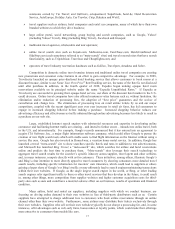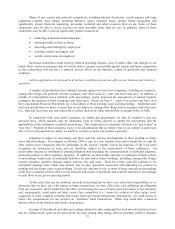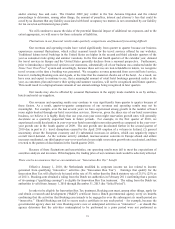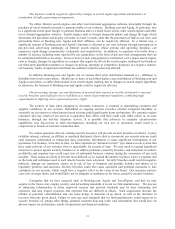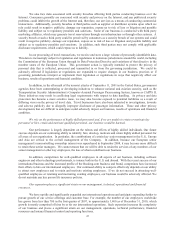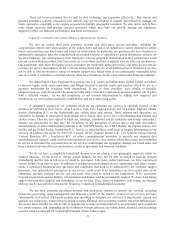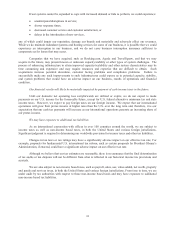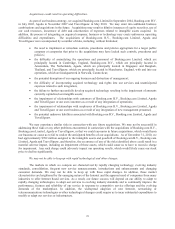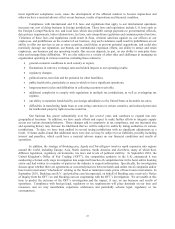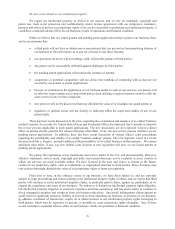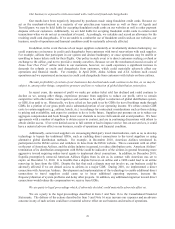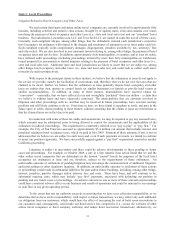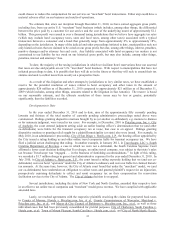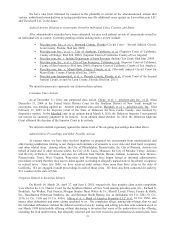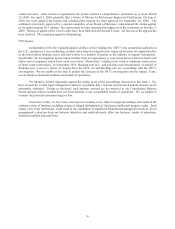Priceline 2010 Annual Report Download - page 100
Download and view the complete annual report
Please find page 100 of the 2010 Priceline annual report below. You can navigate through the pages in the report by either clicking on the pages listed below, or by using the keyword search tool below to find specific information within the annual report.26
We rely on the value of the Booking.com, priceline.com and Agoda.com brands, along with others, and the
costs of maintaining and enhancing our brand awareness are increasing.
We believe that maintaining and expanding the Booking.com, priceline.com and Agoda brands, and other
owned brands, including Lowestfare.com, rentalcars.com, Breezenet.com, MyTravelGuide.com, Travelweb,
hotelroom.com, TravelJigsaw and Car Hire 3000, are important aspects of our efforts to attract and expand our user
and advertiser base. As our larger competitors spend increasingly more on advertising, we are required to spend
more in order to maintain our brand recognition. In addition, we have spent considerable money and resources to
date on the establishment and maintenance of the Booking.com, priceline.com and Agoda brands, and we will
continue to spend money on, and devote resources to advertising, marketing and other brand building efforts to
preserve and enhance consumer awareness of our brands. We may not be able to successfully maintain or enhance
consumer awareness of these brands, and, even if we are successful in our branding efforts, such efforts may not be
cost-effective. If we are unable to maintain or enhance customer awareness of our brands in a cost-effective manner,
our business, results of operations and financial condition would be adversely affected.
We are exposed to various counterparty risks.
We are party to derivative instruments to hedge our exposure to potential dilution upon conversion of
certain of our convertible senior notes. The counterparties to our Conversion Spread Hedges are Goldman Sachs
and Merrill Lynch. Under the Conversion Spread Hedges, we are entitled to purchase from the counterparties
approximately 4.3 million shares of our common stock (the number of shares underlying the 2013 Notes) at a strike
price of $40.38 per share (subject to adjustment in certain circumstances) and the counterparties are entitled to
purchase from us approximately 4.3 million shares of our common stock at a strike price of $50.47 per share
(subject to adjustment in certain circumstances). The Conversion Spread Hedges increase the effective conversion
price of the 2013 Notes to $50.47 per share from our perspective and are designed to reduce the potential dilution
upon conversion of the 2013 Notes. If the market value per share of our common stock at maturity is above $40.38,
the Conversion Spread Hedge will entitle us to receive from the counterparties net shares of our common stock
based on the excess of the then current market price of our common stock over the strike price of the hedge (up to
$50.47). If any of the counterparties to these derivative instruments were to liquidate, declare bankruptcy or
otherwise cease operations, it may not satisfy its obligations under these derivative instruments. In such event, our
fully diluted share count would be increased, which would negatively impact our fully diluted earnings per share.
We will be subject to increased income taxes in the event that our foreign cash balances are remitted to the
United States.
As of December 31, 2010, we held approximately $949 million of cash and short-term liquid investments
outside of the United States. To date, we have used our foreign cash to reinvest in our foreign operations. It is our
current expectation to make further investments in our foreign operations with our foreign cash. If our foreign cash
balances continue to grow and our ability to reinvest those balances diminishes, it will become increasingly likely
that we will repatriate some of our foreign cash balances to the United States. In such event, we would likely be
subject to additional income tax expenses in the United States with respect to our unremitted foreign earnings. We
would not incur an increase in tax payments unless we repatriate the cash and no longer have net operating loss
carryforwards available to offset the taxable income. Additionally, if we were to repatriate foreign cash to the U.S.,
it would use a portion of our domestic net operating loss carryforward which could result in us being subject to cash
income taxes on the earnings of our domestic business sooner than would otherwise have been the case.
In addition, on February 1, 2011, U.S. President Barack Obama proposed significant changes to the U.S.
international tax laws that would limit U.S. deductions for interest expense related to un-repatriated foreign-source
income and modify the U.S. foreign tax credit rules. We cannot determine whether all of these proposals will be
enacted into law or what, if any, changes may be made to such proposals prior to their being enacted into law. If the
U.S. tax laws change in a manner that increases our tax obligation, our results could suffer.
Regulatory and legal uncertainties could harm our business.
The services we offer are regulated by regulations (including without limitation laws, ordinances, rules and
other regulations) of national and local governments and regulatory authorities around the world. Our ability to
provide our services is and will continue to be affected by such regulations. The implementation of unfavorable
regulations or unfavorable interpretations of existing regulations by judicial or regulatory bodies could require us to



